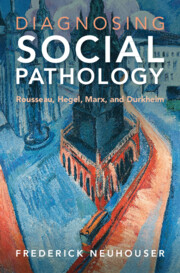Book contents
- Diagnosing Social Pathology
- Diagnosing Social Pathology
- Copyright page
- Dedication
- Contents
- Preface
- Note on Citations
- Chapter 1 Can Societies Be Ill?
- Chapter 2 Society as Organism?
- Chapter 3 Marx: Pathologies of Capitalist Society
- Chapter 4 Marx: Labor in Spiritual Life and Social Pathology
- Chapter 5 Plato: Human Society as Organism
- Chapter 6 Rousseau: Human Society as Artificial
- Chapter 7 Durkheim’s Predecessors: Comte and Spencer
- Chapter 8 Durkheim: Functionalism
- Chapter 9 Durkheim: Solidarity, Moral Facts, and Social Pathology
- Chapter 10 Durkheim: A Science of Morality
- Chapter 11 Hegelian Social Ontology I: Objective Spirit
- Chapter 12 Hegelian Social Ontology II: The Living Good
- Chapter 13 Hegelian Social Pathology
- Chapter 14 Conclusion: On Social Ontology
- Bibliography
- Index
Chapter 1 - Can Societies Be Ill?
Published online by Cambridge University Press: 07 October 2022
- Diagnosing Social Pathology
- Diagnosing Social Pathology
- Copyright page
- Dedication
- Contents
- Preface
- Note on Citations
- Chapter 1 Can Societies Be Ill?
- Chapter 2 Society as Organism?
- Chapter 3 Marx: Pathologies of Capitalist Society
- Chapter 4 Marx: Labor in Spiritual Life and Social Pathology
- Chapter 5 Plato: Human Society as Organism
- Chapter 6 Rousseau: Human Society as Artificial
- Chapter 7 Durkheim’s Predecessors: Comte and Spencer
- Chapter 8 Durkheim: Functionalism
- Chapter 9 Durkheim: Solidarity, Moral Facts, and Social Pathology
- Chapter 10 Durkheim: A Science of Morality
- Chapter 11 Hegelian Social Ontology I: Objective Spirit
- Chapter 12 Hegelian Social Ontology II: The Living Good
- Chapter 13 Hegelian Social Pathology
- Chapter 14 Conclusion: On Social Ontology
- Bibliography
- Index
Summary
Chapter 1 begins to define the concept of social pathology and to assess its usefulness for social philosophy. It distinguishes five conceptions of social illness different from the one employed in this book, which places dysfunction, rather than suffering, at the core of social illness. It argues, further, that while social pathologies must be bad in some way for social members, those individuals are not typically ill themselves. Although there are good reasons for approaching the concept of social pathology with caution – societies differ in important ways from biological organisms, for example – judicious use of the concept can bring to light critique-worthy social phenomena to which theories focused exclusively on justice are blind. The method espoused for diagnosing social illnesses is a form of ethically informed immanent critique that bears some similarities to medical diagnosis but refrains from ascribing moral blame to the individual participants in unhealthy social practices.
Keywords
- Type
- Chapter
- Information
- Diagnosing Social PathologyRousseau, Hegel, Marx, and Durkheim, pp. 1 - 28Publisher: Cambridge University PressPrint publication year: 2022

